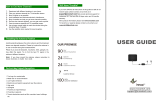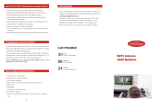Page is loading ...

USER GUIDE
1. Experiment with dierent locations in your home.
2. Face your antenna towards the TV transmitter towers.
3. Move it higher up as possible.
4. Avoid obstacles and eliminate electronic interference.
5. Move it outside can help you get more channels possibly.
6. Re-Scan the channel regularly, you may get more surprise!
7. Face the antenna towards the TV broadcast towers.
8. Use a longer coaxial cable to reach the window facing the broadcast tower if
needed.
9. Use the amplier when needed to boost reception.
The antenna is required to be connected to a DVB-T/ATSC (Advanced Television
Systems Committee) decoder TV antenna receiving port instead of the antenna
IN or other cable IN port on the back of the TV. Most of the HDTVs produced after
2016 have built-in DVB-T/ATSC and can receive ATSC digital TV signals. If your TV
was purchased earlier, but has a digital TV interface, you will need to check with
your TV manufacturer's customer service to see if it really supports DVB-T/ATSC.
If not you will need to purchase a digital converter box to connect the antenna.
The received signal will vary depending on geographic location and location of
the light wave signal, antennas, hills, buildings,etc.
Even tall trees can aect reception. Currently, the receiving channel is dierent in
each place. You can check the channel you can receive by visiting dtv.gov/maps
or tvfool.com
Anything standing between the indoor antenna and the broadcast towers can
degrade reception. Please try to place the antenna in or near a window facing the
broadcast tower.
Please try to avoid all obstacles, mountains, trees, garages, etc.
may aect the signal. Try to nd the best TV signal in the window at dierent
locations.
Note: If you have moved the antenna, please remember to rescan channels, no
matter how small.
1. Too long of a coaxial cable
2. Metal near or around windows
3. Low E-glass windows
4. Electronics and electric equipment near the antenna
5. High wind
6. LED lights
7. Proximity to major freeways
8. Proximity to airports
9. Terrain obstructions such as hills, mountain, trees, buildings,etc.
Place the antenna in a window facing the direction of the TV broadcast tower.
Height and direction of the antenna can aect reception strength.
Note: Buy a longer coaxial cable if your TV doesn't have enough space for an
antenna behind it.
Note: If your antenna has an amplier, directly connect the TV rstly.
If reception is not good, please connect the amplier to improve reception and
rescan for channels.
After connecting the antenna to the TV, use the TV remote control to scan for
channels.
Here are generic steps to run a channel scan:
1. Run the "Scan" function on your TV by pressing the Menu button on the
remote control and nd "Scan" or "Setup."
• Make sure the TV is set to "Air" or "Antenna" instead of "Cable."
2. Below is a basic channel scan menu for your reference. Please remember that
dierent televisions have dierent setup processes.
If you have followed all instructions in this guide but still do not receive signal,
please contact us by email us at [email protected].
We provide technical support for customers 24/7. And we oer 90-days return
and 24-months warranty.
More product information please visit www.innootech.com
To become our super vip please contact us by email us at
3. You will receive digital signals through the antenna once the scan is complete
• Consult your TV's manual or ask the manufacturer if you do not know how to
access the channel scan function.
Note: Please remember to rescan the channel periodically as you may
encounter some new channels that cannot be received during cloudy or
inclement weather. This will help you get more channels.
Address: Building 7, 1980 Cultural and Creative
Industry Park, ShenZhen, China
Manufacturer: Opolo Tech Co., Ltd
Address: Breslauer Str. 65, 42277 Wuppertal, Germany
E-mail:[email protected]
www.innootech.com
Importer:
- 01- - 02 - - 03 -
- 05 - - 06 -- 04 -
/






